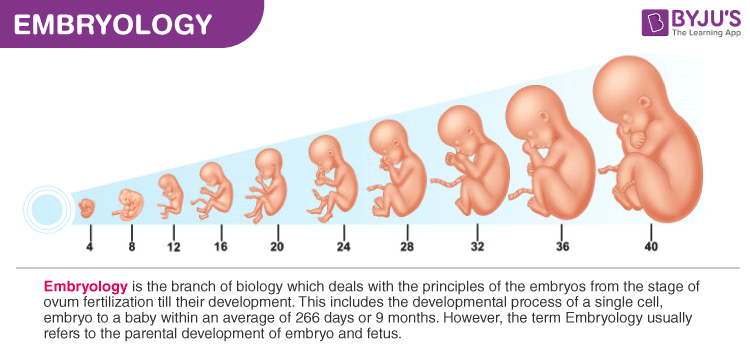Table of Contents
What is Embryology?
Embryology is the study of embryo development. This includes the developmental process of a single-cell embryo to a baby. Embryology usually refers to the prenatal development of a foetus.
Embryology is an important research area to know about the impact of mutation and the progression of genetic disorders. An important aspect of embryology is Stem Cell Research.

What is Embryogenesis?
Embryogenesis is the process by which an embryo develops into a foetus. It begins when an ovum and sperm meet and fertilization occurs. The fertilization results in the formation of a zygote. The zygote divides mitotically multiple times without any significant growth and cellular differentiation, leading to the development of an embryo.
Human Development
It is a highly precise and complex process, wherein a single cell differentiates and develops into a multicellular human being. A continuous process begins when an oocyte (ovum) is fertilized by a sperm to form a zygote which differentiates into a definitive organ system and thereafter into their early functional stage.
The mechanisms of Transformation include- cell-division, cell migration, growth, cell differentiation, apoptosis, and cell rearrangement.
A better understanding of embryology helps us in preparing healthcare strategies :
- Therapeutic procedures for infertility
- Prenatal diagnosis and surgical treatments
- Mechanisms to prevent birth defects
Duration and Stages of Pregnancy
Human gestation lasts an average of 266 days (38 weeks, 9 months) and is divided into 3-month intervals called trimesters.
1st trimester (1st 3 months: Week 1 – 12) — Pre embryonic and embryonic development stress, drugs and nutritional deficiencies are the most common symptoms during this stage. The “morning sickness” may be nature’s way of avoiding harmful food products getting consumed by the mother, which can have a damaging effect on the embryo, such as raw cabbage, potatoes, coffee, overcooked meat, etc.
2nd trimester (2nd 3 months: Week 13 – 24) — The foetal development starts and most of the organs get developed.
3rd trimester (3rd 3 months: Week 25 – birth) — In the third trimester, the baby continues to grow. The baby shows various movements like stretching, kicking, etc. During thirty weeks there is a huge development in the baby’s sense organs, fingernails are visible, bones get hardened, formations of red blood cells (RBC) in the bone marrow and finally have shed all the lanugo.
For more detailed information on Embryology, Embryogenesis, and Human Development, visit BYJU’S.

Fabulous explanation.
What an explanation, niceee 🙏 thank you so much